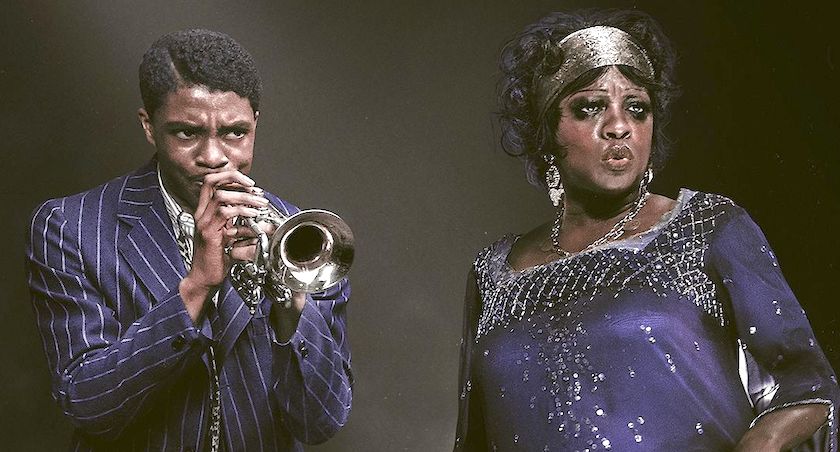
2016 Oscar-winning film Fences was one of ten adaptations – known as “The Pittsburgh Cycle” – by acclaimed playwright August Wilson that Denzel Washington had signed on to produce for HBO films. That deal eventually shifted to Netflix, with Ma Rainey’s Black Bottom being the second production of that proposed series. And with it, another lead role for Viola Davis, who earned an Academy Award for her role in Fences. Here she delivers another outstanding performance as Ma Rainey, a real-life singer who is widely regarded as the “Mother of the Blues”, and it’s a part that may/should put her in line for another gold statue.
Much like Fences, Ma Rainey’s Black Bottom is more or less a one-set piece, and it takes place in a decrepit recording studio during one sweltering summer’s day in 1920’s Chicago. With a fiery attitude and a “don’t mess with me” demeanour, Ma locks horns with her manager and producer, while her band engage in their own battle of minds in the rehearsal room below.
Chadwick Boseman co-leads the film as Levee Green, a young, ambitious and disagreeable trumpet player who marches to the beat of his own drum and bestirs the ire of Ma Rainey. He represents a modern interpretation of the blues, while Ma and her band are deeply invested in a more traditional and soulful sound. Similarly, to the effect of the heatwave featured in Spike Lee’s racial masterpiece, Do the Right Thing, the stifling temperatures on this particular day infest the narrative, possessing each character, culminating in an explosion of compressed agitations.
Director George C. Wolfe (Nights in Rodanthe, You’re Not You) delivers a profound recital that delves deep into black history and transforms into a complex psychological drama, exploring various experiences of discrimination and racism, while presenting contrasting views of overcoming such persecution. Indeed, for such a simple production Ma Rainey’s Black Bottom is a thoroughly engaging film, providing its audience with a lot to process and consider.
The film is immediately arresting, the impressive production design baring a striking resemblance to Fences. Tobias A Schliessler’s (Beauty and the Beast) brown-tinged cinematography boasts a unique look that emphasises a certain light, capturing the real sense of soaring temperatures, while maintaining a distinct downtrodden atmosphere. Complimentary are the costume and makeup designs, which, particularly with Davis, intensify the fatigue of the summer heat.
As previously noted, Davis delivers a knock-out performance. She embodies the Ma Rainey character so effectively that she is almost unrecognisable. Drenched in sweat with running makeup, she represents the heart of blues music and assumes full command of her position as a prominent black woman. Seemingly with the upper hand at all times, the adapted screenplay by Ruben Santiago-Hudson (Lackawanna Blues) further explores the hidden realities of black fame, whereby the sense of power is persistently undermined by the inherent social structures of the time.
Chadwick Boseman, who passed away during the film’s postproduction, is superb as the cocky up-and-comer with a chip on his shoulder. Believing he is destined for greatness, his character thwarts his bandmates’ routine at every opportunity with a deep-seeded belief that he is smarter than them all. He appears determined to sabotage his own opportunities and presents a troubled demeanour, which is explored in one particularity powerful monologue that ought to earn the beloved Black Panther star a posthumous Oscar nomination. With the knowledge that Boseman was dying at the time, watching his performance is quite chilling. In fact, some moments when he wrestles with his own mortality are downright eerie.
The rest of the ensemble include Glynn Turman, Colman Domingo and Michael Potts, who each have their moment of reflection and pose differing perspectives on the progression of Black America, all while being surrounded by the metaphorical sounds of blues, which, as Ma Rainey puts it, is “life’s way of talking”.
With two of the ten Pittsburgh Cycle plays now adapted to profound effect, and the third currently in production (titled The Piano Lesson, which was previously adapted into a Hallmark film in 1995), we can only hope that Netflix stand by Denzel Washington’s bold endeavour and produce the remaining seven. If they each arrive as powerfully as this, what a contribution to the African American story the full cycle will be!

‘Ma Rainey’s Black Bottom’ is now streaming on Netflix. Watch it HERE.










